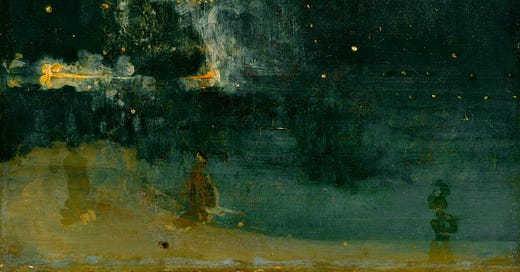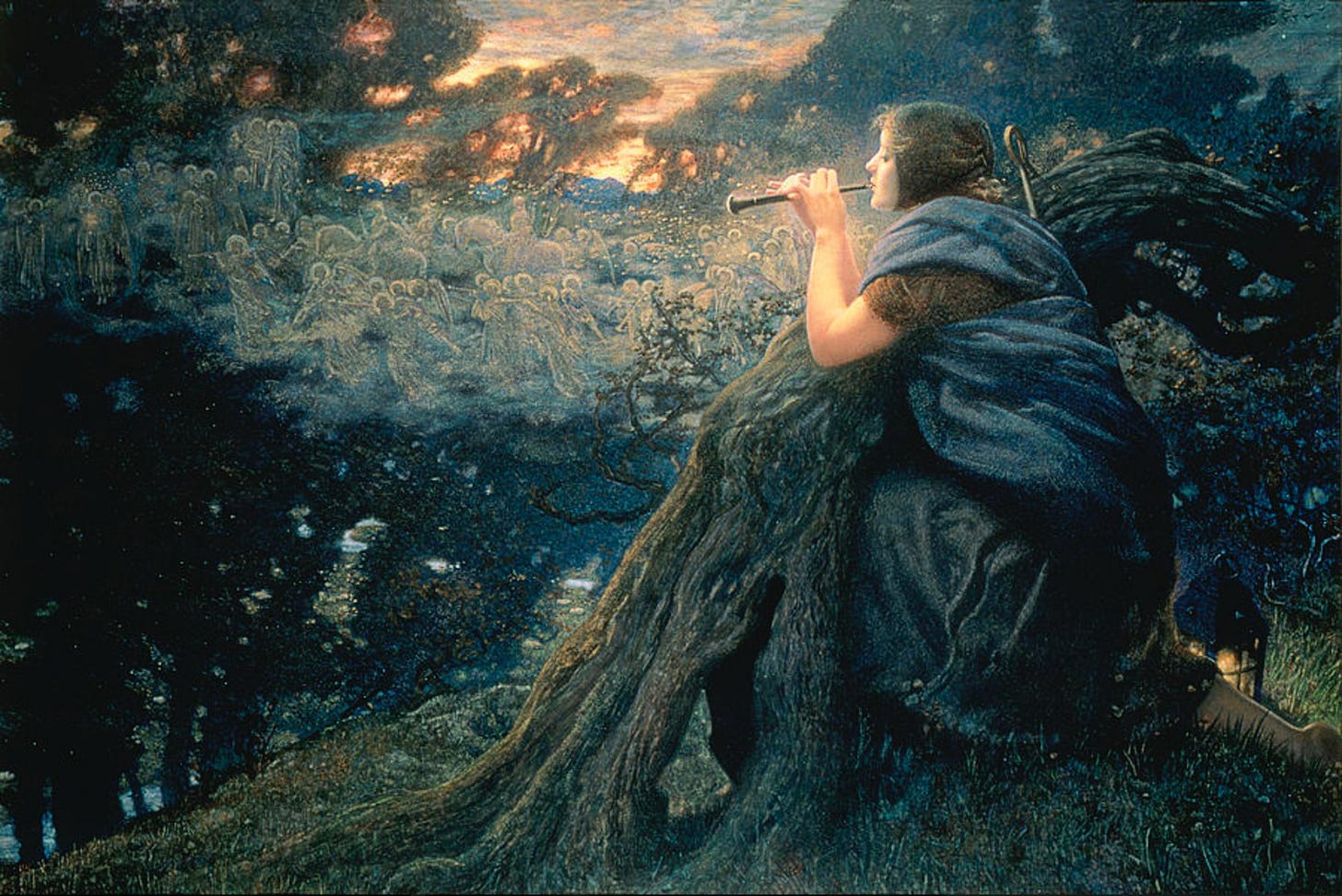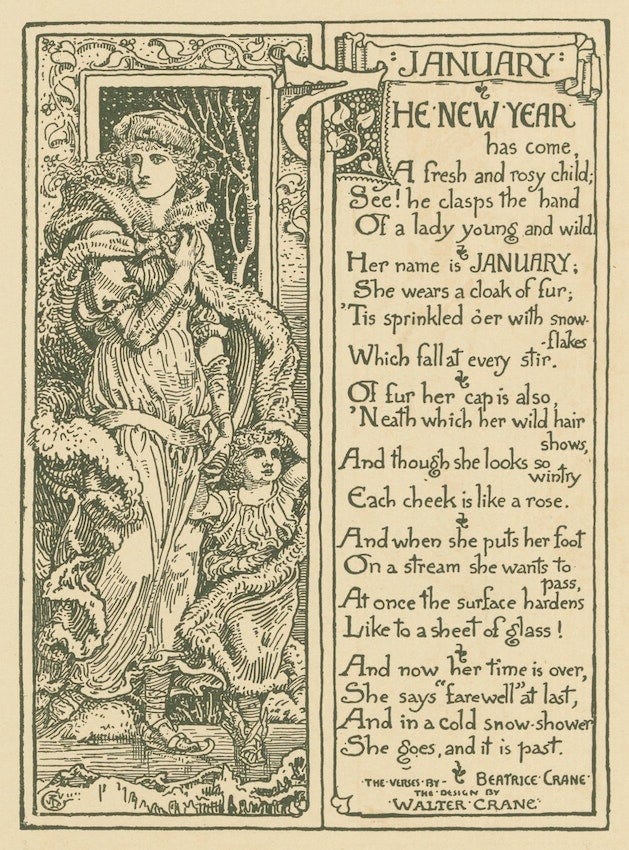'We hug the world until it stings'
As 2024 approaches, here is a fresh, thoughtful poem from a once best-selling American poet -- plus a bumper selection of other New Year's poems to help usher it in. Happy New Year, everyone!
Ella Wheeler Wilcox, ‘The Year’
What can be said in New Year rhymes, That’s not been said a thousand times? The new years come, the old years go, We know we dream, we dream we know. We rise up laughing with the light, We lie down weeping with the night. We hug the world until it stings, We curse it then and sigh for wings. We live, we love, we woo, we wed, We wreathe our prides, we sheet our dead. We laugh, we weep, we hope, we fear, And that’s the burden of a year.
About the author
Ella Wheeler Wilcox (1850-1919) was born in Wisconsin and began publishing poetry already in her teens, becoming a prolific poet and journalist. Her book Poems of Passion (1883) sold 60,000 copies in just two years. She also published Poems of Experience (1910), Poems of Peace (1906), and Shells (1873), several novels, and two autobiographies.
To Read Alongside…
Thomas Hardy’s ‘New Year’s Eve’ and Sylvia Plath’s ‘New Year on Dartmoor’, although written decades apart, both pause in similar reflection over the mysteriousness of the turn to a new year. Hardy’s poem was first published in his 1909 collection, Time's Laughingstocks, a title that is perhaps all the introduction it needs:
"I have finished another year," said God, "In grey, green, white, and brown; I have strewn the leaf upon the sod, Sealed up the worm within the clod, And let the last sun down." "And what's the good of it?" I said. "What reasons made you call From formless void this earth we tread, When nine-and-ninety can be read Why nought should be at all? "Yea, Sire; why shaped you us, 'who in This tabernacle groan' - If ever a joy be found herein, Such joy no man had wished to win If he had never known!" Then he: "My labours — logicless — You may explain; not I: Sense-sealed I have wrought, without a guess That I evolved a Consciousness To ask for reasons why. "Strange that ephemeral creatures who By my own ordering are, Should see the shortness of my view, Use ethic tests I never knew, Or made provision for!" He sank to raptness as of yore, And opening New Year's Day Wove it by rote as theretofore, And went on working evermore In his unweeting way.
**************************
The ‘unweeting’ (unwitting or unknowing) in Plath’s ‘New Year on Dartmoor’ was occasioned by an ice storm. Nearly full-term with her second child, Plath was out for a walk with her one-and-a-half-year-old daughter near their home in North Tawton, on the north edge of the moor:
This is newness: every little tawdry Obstacle glass-wrapped and peculiar, Glinting and clinking in a saint's falsetto. Only you Don't know what to make of the sudden slippiness, The blind, white, awful, inaccessible slant. There's no getting up it by the words you know. No getting up by elephant or wheel or shoe. We have only come to look. You are too new To want the world in a glass hat.
You might also enjoy two Janus-faced New Year’s poems. Robert Service’s ‘New Year’s Eve,’ set in one of the poet’s raucous Yukon saloons, features a drunken hobo remembering, for the last time, better nights with his lost love, Ethel:
Roses she wore on her breast that night. Oh, but their scent was sweet! Alone we sat on the balcony, and the fan-palms arched above; The witching strain of a waltz by Strauss came up to our cool retreat, And I prisoned her little hand in mine, and I whispered my plea of love. Then sudden the laughter died on her lips, and lowly she bent her head; And oh, there came in the deep, dark eyes a look that was heaven to see; And the moments went, and I waited there, and never a word was said, And she plucked from her bosom a rose of red and shyly gave it to me. Then the music swelled to a crash of joy, and the lights blazed up like day, And I held her fast to my throbbing heart, and I kissed her bonny brow. "She is mine, she is mine for evermore!" the violins seemed to say, And the bells were ringing the New Year in — O God! I can hear them now….
**************************
Looking for something less despairing, perhaps? Tennyson’s ‘In Memoriam’ contains these famous forward-hoping lines:
Ring out the want, the care, the sin, The faithless coldness of the times: Ring out, ring out my mournful rhymes, But ring the fuller minstrel in. Ring out false pride in place and blood, The civic slander and the spite; Ring in the love of truth and right, Ring in the common love of good. Ring out old shapes of foul disease; Ring out the narrowing lust of gold; Ring out the thousand wars of old, Ring in the thousand years of peace. . . .
**************************
For yet another perspective, here are the final stanzas of Jamaican-American poet June Jordan’s ‘On a New Year’s Eve’, juxtaposing the fragility of our planet and the temporariness of human existence:
I read the papers preaching on
that oil and oxygen
that redwoods and the evergreens
that trees the waters and the atmosphere
compile a final listing of the world in
short supply
but all alive and all the lives
persist perpetual
in jeopardy
persist
as scarce as every one of us
as difficult to find
or keep
as irreplaceable
as frail
as every one of us
and
as I watch your arm/your
brown arm
just
before it moves
I know
all things are dear
that disappear
all things are dear
that disappear**************************
That same wistful idea can be found in many New Year’s poems—heralding the new while mourning the old. Here, though, the ‘brown arm’ grounds the poem in a racial context that gives a different slant to the sense of fragility and fleetingness.
And finally, there is the song ‘Auld Lang Syne’ that is sung around the world on New Year’s Eve, usually with arms interlinked in the warmth of human fellowship. It is attributed to Robert Burns, though he said he only ‘took it down from an old man’s singing.’ The phrase ‘auld lang synes’ certainly occurs in earlier Scottish poems and songs, and many poets composed upon the New Year’s theme. Below are lines from ‘The Daft-days,’ by the Edinburgh poet Robert Fergusson (1750-1774), whom Burns regarded as ‘heaven-taught’ and ‘my elder Brother in the muse’:
…For nought can cheer the heart sae weil
As can a canty Highland reel,
It even vivifies the heel
To skip and dance:
Lifeless is he what canna feel
Its influence.
Let mirth abound, let social cheer
Invest the dawning of the year;
Let blithesome innocence appear
To crown our joy,
Nor envy wi' sarcastic sneer
Our bliss destroy….Suggest a LitHit!
Tell us your own favourites from literature you've read, and we can feature you as a Guest Curator if you like. Just email us with the following information:
Your full name
The title of the book you're suggesting
The location of the excerpt within the book (e.g., "in the middle of chapter 5"), or the excerpt itself copied into the email or attached to it (in Word)
Why you love it, in just a few sentences
About LitHits
LitHits helps you make time for reading by bringing you unabridged excerpts from brilliant literature that you can read on the go, anytime or any place. Our curators carefully select and frame each excerpt so that you can dive right in. We are more than a book recommendation site: we connect you with a powerful, enduring piece of literature, served directly to your mobile phone, tablet or computer.
Today's guest curator...
One of our readers, Steve King, generously volunteered most of the ‘To Read Alongside’ poems and commentary.
You might also enjoy...
Feedback
We'd love to hear your thoughts on our newsletter:
kshepherdb@yahoo.co.uk
Graphic design by Sara Azmy
All curation content © 2023 LitHits. All rights reserved.






